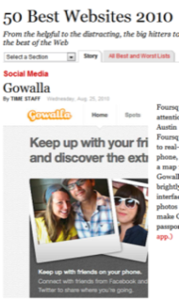TIME has today released its “50 Best Websites of 2010,” an annual list to the best of the Web, which aims to include everything from “the big hitters to the unknowns.” Alongside obvious choices like The Onion, Wikileaks, National Geographic, Mayo Clinic and TED, the list has properly outed some of our personal favorites – startups like SpringPad, MOG, Chegg, Mint, Tumblr, SeatGuru and Grooveshark.

One surprising choice, however, was TIME’s pick for best location-based social networking service (LBS): Gowalla. While obviously Gowalla is popular among early adopters, it’s also an underdog in the LBS world, trailing other services like Foursquare, MyTown and even Loopt in terms of users.
Among today’s location-based networks, also often referred to as “check-in” services due to the way they allow users to register their arrival at a particular location, you’ll find some of the most innovative new ideas in mobile, if not in the entire tech industry itself.
Various experiments include everything from the addictive gameplay of Booyah’s MyTown to the mobile coupons of Shopkick to the more social Foursquare, Gowalla, Brightkite, Loopt and others.
Although called out by analysts as more “hype” than bite due to relatively small numbers of users (Loopt leads the pack with a 4 million users, Foursquare is closing in on 3 million, for example), the field represents, possibly, the “next big thing” for marketers – if not now, then soon.
And recently, the idea of location-based services received a lot more attention thanks to Facebook’s launch of “Places,” a new Facebook feature that will allow the network’s 500 million users to register their presence at a particular venue in real-time.
Back to the Issue at Hand: Gowalla?
TIME says it picked Gowalla because it’s just “more fun” than others thanks to brightly colored badges (we believe they mean stamps or pins?) and its “zany” interface.

We like Gowalla as much as the next guy, here at ReadWriteWeb, having touted it once as the “anti-Farmville” (that’s a compliment, mind you) and even using it in virgin territory (“To Boldly Go Where No Gowalla Geek Has Gone Before“). But the fact of the matter is that Gowalla has lagged behind its competitors in sheer user numbers – a fact probably related to the company’s refusal, until last month, to release a Read/Write API. An API, or Application Programming Interface, would have allowed developers to build software on top of Gowalla to read its data and both pull and push check-ins to and from the service. Foursquare has an API, and it became so popular that the company actually decided to launch an app store to house all the third-party tools using it, now numbering in the hundreds.
Meanwhile, I can’t even begin to tell you the numerous conversations I’ve had with those from third-party location-based app companies who promised their service wasn’t “yet another check-in app,” but would integrate with the popular services already existing. “What about Gowalla?” I’d ask. “As soon as they release an API,” was the inevitable answer.
Gowalla’s delay to open up its service may ultimately be its downfall, in a case of too-little-too-late. It allowed its closest competitor, Foursquare (that is, closest in terms of features – Gowalla has “stamps,” Foursquare has “badges”) to surge ahead. Now Gowalla is up against Facebook and various other check-in/mobile couponing apps, too. And Foursquare is only weeks away from the launch of a revamped version of its service which promises to be even more game-like than before, with more badges, a new system for using points, possible Facebook API integration and more.
As for Gowalla, we hope it sticks around – it is fun after all – but we’re not sure that it deserved the moniker “the best of 2010.”

















